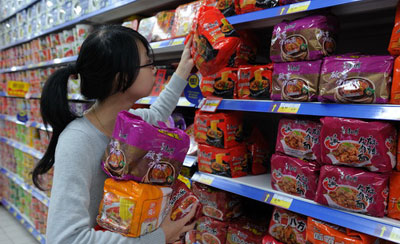


Issue 498, Dec 13, 2010
Corporation, page 29
Translated by Chen Ximeng
Original Article: [Chinese]
Wang Yong* likes to eat Master Kong (康师傅) instant noodles, but he was surprised that over the past couple of weeks he's been unable to find his favorite brand of noodles on the shelves of his local Carrefour. When he asked an employee of the supermarket chain what happened, he was told that they had sold out of the noodles.
In fact, a reporter from the Economic Observer recently found that the Master Kong brand has halted supply of their products to Carrefour for over a month. The cause appears to be Carrefour's refusal to participate in the price hikes mandated by the Master Kong brand in November.
Cutting off supply over a refusal to raise prices is rare in the instant noodles business, said a director of the Beijing division of an instant noodle manufacturer.
Severing Supply
On November 1st, the Master Kong brand increased the price of its line of classic instant noodles, a line representing almost three tenths of its sales volume, by 10 percent from 2.0 yuan to 2.2 yuan per pack.
However, a Carrefour store in Hebei Province refused to raise prices, and opposition to the price increase spread to every division of the store in China.
In response, the Master Kong brand severed its supplies to Carrefour.
Carrefour then froze annual agreement talks with Master Kong in protest. At the time, Master Kong and Carrefour were renewing their annual agreement and the negotiations had reached a deadlock, said a source close to the instant noodles industry.
Master Kong confirmed to the EO its decision to stop supply to Carrefour and the breakdown of annual talks with the French retailer on December 8.
A source from Master Kong revealed that Carrefour's refusal to raise prices would have caused price confusion amount retailers, which the Master Kong brand did not wish to see.
He adds that cooperation with other supermarkets and superstores remains smooth.
The head of Carrefour's China Office has responded to inquiries from the EO by saying that they are still assessing the situation and await details from Carrefour's Northern Division.
Confrontation
Instant noodles suppliers have made several rounds of price hikes in the past three years, ever since the overall price adjustment in the industry in 2007. This is the first time a supplier like Master Kong has chosen to sever supplies to a distributor like Carrefour for the length of a month.
This source added that Carrefour was the last of China's supermarkets and superstores to accept the round of price hikes from suppliers in 2007.
A source from inside the food-retail industry revealed that as long as one superstore refused the price increases, other stores followed.
However, this does not mean negotiations always end in a standoff. If suppliers insist on a price increase, major retail distributors will talk suppliers into increasing marketing and promotional activities and this way, suppliers can keep a unified stable price at various retail distributors using the method of "visible increases and hidden promotions," and superstores can lure more customers with promotional advertising.
This source adds that the superstores must have a large enough sales base to assure that suppliers are willing to make concessions in return for increased marketing. Superstores have leverage in negotiations with suppliers only if they have the resources and retail channels to deliver on sales promises.
Carrefour has held a dominant position in the eyes of suppliers for a long time. Suppliers complain that Carrefour puts heavy pressure on them during negotiations. However, they have to accept the retailer's terms because no other retailer compares with Carrefour in terms of sheer demand of commodities and suppliers. Local suppliers in particular are too weak to challenge them.
But now, the market has changed.
RT-Mart (大润发) surpassed Carrefour in per unit sales volume and total sales volume to become the new leader in the retail industry in 2009, according to ratings announced by the China Chain Store & Franchise Association. Last July, for the first time in China, Carrefour shutdown a store in Xi'an. Domestic retailers like Wu Mart have caught up with Carrefour in the total sales volume of certain goods and many local large-scale suppliers are becoming stronger.
The recent conflict between Century Mart and Kraft is also a struggle between retailers and suppliers.
A long-term observer of the retail industry tells us: "Stopping supply to Carrefour is a negotiating strategy. Like the conflict between Century Mart and Kraft, it's hard to know who will cave. It depends on who's stronger. But in the end, the two sides will reach an agreement."
* Wang Yong is a pseudonym
This article was edited by Ruoji Tang and Paul Pennay

